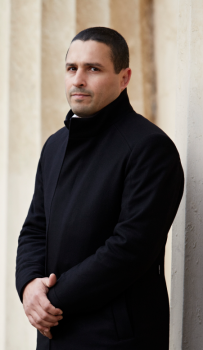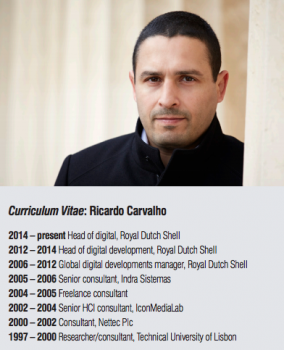
SPEAKING IN CODE
From self-professed geek in his teenage days to head of digital development at Shell, Ricardo Carvalho’s love of technology has never faltered. He talks digital with Andrew Thomas.
Photographs by Jeff Leyshon
 For the elite athletes of Portugal, normal university admission rules do not apply. As a reward for their endeavours, members of the national sporting squads can go to any Portuguese university and study any course. As a member of the Portuguese national judo squad, Ricardo Carvalho’s first inclination was to head for medical school, but before committing he sought the advice from his uncle, a doctor. Things could have been very different for Carvalho had he chosen to ignore that avuncular advice.
For the elite athletes of Portugal, normal university admission rules do not apply. As a reward for their endeavours, members of the national sporting squads can go to any Portuguese university and study any course. As a member of the Portuguese national judo squad, Ricardo Carvalho’s first inclination was to head for medical school, but before committing he sought the advice from his uncle, a doctor. Things could have been very different for Carvalho had he chosen to ignore that avuncular advice.
“Listen to me, Ricardo,” his uncle said, “I know you, you don’t have the personality for medical school. It’s not right for you.” With those words of discouragement, Carvalho was set on a path that led to him taking one of the world’s most senior digital communications roles, the head of digital at Royal Dutch Shell.
While still debating his options for study, Carvalho chanced upon a television documentary on ergonomics. “I was fascinated by this. Less on the ergonomics, but on how computer modelling was helping companies design objects with ergonomics in mind. I then discovered that one of the few university courses on ergonomics was in Lisbon, my home city. I thought I can try it and if I don’t like it I can always change course.”
By his own admission, Carvalho was a teenage geek. Like many boys at that time, his first love was the ZX Spectrum, one of the first personal computers. Refusing to let the untranslated Spectrum manual deter his programming development, he sat up until the early hours night after night with his father’s dictionary, teaching himself English as well as computer code.
A similar dedication continued at university. Carvalho didn’t just study – before finishing his degree he was already lecturing other undergraduates on ergonomic design and human-computer interaction, the area of ergonomics that was his specialisation. When he finished his degree, he stayed on at Lisbon University, working on research projects and continuing to lecture.
Although Carvalho enjoyed working at the university, after three years he knew that a lifetime of academia was not for him.
“I wanted to get out of academia, join the professional sector and do what I called ‘real work,’” says Carvalho, mischievously adding, “I don’t know if I would call it that now.”
In Portugal at that time there was still an element of the science fiction surrounding human-computer interaction, so Carvalho made the decision to leave for the UK. “Technology was still quite immature in Lisbon, but London was in the middle of the internet boom. I got a job with a digital agency called Nettec [subsequently consumed by LBi Digitas]. What I was doing still didn’t really have a name, but I was basically a user experience consultant.”
This was 2000 and Europe, and London in particular, was at the heart of digital. “California wasn’t the same back then – there was no iPhone or Google. Mobile was just taking off, Nokia was the number one brand and everything seemed to be happening in London.” Carvalho knew no one in London and acknowledges there was an element of culture shock when he first arrived. “It wasn’t the work ethic – work can be demanding wherever you are – but the ways of working in London were very different. Portugal was much more hierarchical. In London, you had more freedom to do your own thing.”
Cultural differences (and linguistic ones – by coincidence, all of his dealings, from BT to his landlord, were with heavily-accented Scotsmen, a dialect he found incomprehensible) aside, Carvalho loved his time in London. “Creatively, what separates London from other places, is the quality of projects. The big and exciting projects were there. Now there is more of a balance with other European capitals, but at the time it was really noticeable.”
It wasn’t just the scale that struck Carvalho, but an evident difference in creativity, born from, he feels the encouragement of ideas and the ways with which issues are dealt.
His academic background was a great help to Nettec, providing a sense of science and structure in the work they were doing. Equally, however, Carvalho benefited from the commercially-minded agency environment. He says, “I really developed an understanding of the disciplines that you will never experience from university life.”
His time in London, however, was not to last. In 2002 the dotcom bubble burst, Nettec scaled down and Carvalho was let go. He was desperate to stay in London, but no one was recruiting digital specialists so he returned to Lisbon. There, to his surprise, he found the downturn hadn’t yet reached southern Europe and he walked into a prominent role at IconMediaLab as senior HCI consultant, dividing his time between Lisbon and Madrid.
Carvalho thrived at IconMediaLab. His experience in London stood him in good stead and his project management skills impressed those with whom he worked. IconMediaLab were getting the bigger projects and Carvalho was getting to work on them. “There suddenly seemed to be an understanding of the effects of the internet to brand. I worked on the website for the biggest bank in Portugal and there was a realisation that they had to put their customers there.” The work Carvalho did obviously stood the test of time; the bank only recently updated the work he had put in place.
The economic downturn, however, finally caught up with Carvalho and IconMediaLab shed the bulk of its staff. For the second time in three years he found himself jobless. Fed up with the poor management endemic to so many of those early internet firms, Carvalho decided to go it alone. His skills were much in demand and he wasn’t short of freelance contracts. He continued working for financial services clients and then took on a contract for a client producing software for telecoms firms. “They had huge HCI problems – no one could use their software – so they said. “‘Ricardo come for six months, see if you can fix our software.’”
It was winter and the company was based in Cork, Ireland. “It was terrible, I had never come across a place with such bad weather. It was relentless. One night I was sitting alone in my hotel, bored and angry at having to be in Ireland, and I decided I had to change my life. I was tired of being a specialist in user experience and saw a lifetime of taking up one HCI project after another. So that evening I decided I had to do a MBA.” Six months later he was enrolled at IE Business School in Madrid, funding his studies by developing internet projects for Spanish IT and defence firm, Indra Sistemas.
Indra Sistemas provided Carvalho with stability and income, and he also enjoyed the work. His intention was to remain there after his studies finished. But then, halfway through the MBA course a call came through from headhunters pushing a job for Shell in the Netherlands. “I’d actually turned Shell down during my time in London. So my first thought was ‘like really, again, Shell?’ But I thought I would see them and the job, creating their first set of online standards, seemed really interesting. So I said yes.”
But Shell didn’t just want him – they wanted him straight away. For the next six months Carvalho spent Monday to Thursday in Shell’s headquarters in The Hague before flying off to Madrid for a long weekend of intensive studying to complete his MBA. “It was a very tough six months, but Shell were very supportive,” Carvalho says. “That was eight years ago, and I’ve been with Shell ever since.”
Carvalho speaks of Shell in an almost evangelical tone. He clearly loves the company. Much of that, however, may be because of his achievements there. Digital’s role has increased massively during his tenure and Carvalho believes Shell’s leadership correctly forecasts where digital could take the business. “Their vision is still being fulfilled and it really hasn’t changed much. The initial concepts of the importance of standardisation, of having alignment between Shell’s very many businesses and a desire of not working in silos takes a long time to fulfil in a company as big as Shell. But we’ve achieved a consistency in standardisation and governance and I feel really fortunate that we got it right early. When I talk with my peers I realise there are many companies still at the stage we were eight years ago, with different websites across different businesses in different countries and are now bolting mobile and social on top.”

Carvalho feels the company is now profiting from the alignment of governance and branding that he created in his early years at Shell. Although he works within the communications department, Carvalho doesn’t see himself as a typical communications person. “I am a digital professional. That’s how I would describe myself. I am still a geek.” He does, however, feel that communications is the right place for digital to sit. “Some companies put the digital functions within marketing and some within IT, but it should be within communications. Communications is a function, it already works across the different businesses, and this gives you a greater neutrality. You can appreciate all the different business needs and drive together to work in an aligned form to get all of those needs met.”
Despite the importance of digital to Shell, Carvalho feels the digital revolution is still in its infancy. “We’re not even halfway and the revolution is happening everywhere. For example the objectives for Shell in talent attraction are huge. We want the best people and there is a lot of competition. The best people are seeing opportunities through digital channels; mobile, web, social. If you want to capture the best talent you have to use digital or you’ll lose them.”
It is clear that Carvalho is passionate when he talks of digital’s future. “When people talk about digital and productivity, often they’re talking about the Internet but increasingly it’s about internal mobile applications, internal e-learning tools, internal digital publications and so on. All of that has a tremendous impact on the way we work and deal with each other as an organisation.”
His first exposure to digital, his human-computer interaction and ergonomic studies from his university days still affect Carvalho’s approach. “We are talking about how important mobile is, but wait until you have the wearables, the watches, the Google Glasses. Some of them will succeed, and others which don’t even exist right now will become successful. The common thing is all of the new tools will be digital. All of them will need managing. They will all need content, all will need branding, the proper user experience and so on. Digital’s increasing importance is going to continue.”
Carvalho has been with Shell for eight years, a long time in one company for many people. At Shell, however, this isn’t unique. He has had the same line manager since he started; Simon Saville, the VP for communication production. Saville has been with the company for 28 years. Shell has a system of redefining or changing employees jobs every four years, and Carvalho is undergoing this process now. He believes it’s one of the reasons why staff there have such long careers. “It is in your interests to evolve, to work for different people and to get exposure to new areas and that’s one of the good things about Shell”.
He knows, however, his new role will encompass digital. He’s not keen on making personal long term forecasts, but does see that there will come a time when digital will have a direct contact with the board. As arguably one of Europe’s most senior digital communications professionals if ever the job were to exist, Ricardo Carvalho would surely be the main contender.



